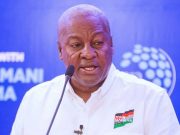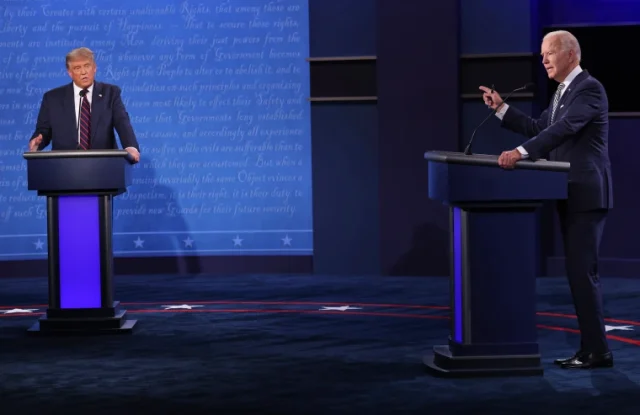Joe Biden and Donald Trump have agreed to a televised presidential debate on 27 June which will air on CNN.
The network announced the event on Tuesday, and said it would take place in the key swing state of Georgia.
No audience will attend the debate in Atlanta, it added, while moderators will be announced at a later date.
The announcement came shortly after Mr Biden laid out his terms for taking on former President Trump in a debate ahead of November’s election.
Mr Biden broke tradition and proposed two televised debates in June and September. His rival quickly accepted, before suggesting they debate every month.
“We believe there should be more than just two opportunities for the American people to hear more from the candidates themselves,” the Trump campaign said.
Both candidates have traded barbs on social media, with Mr Trump stating: “Just tell me when. Let’s get ready to rumble!!!”
Mr Biden said Mr Trump was “free on Wednesdays” – a reference to his criminal trial in New York, while Mr Trump claimed his rival was the “worst debater” who “can’t put two sentences together”.
Mr Biden’s proposal of two debates breaks several established traditions.
It bypasses the presidential debate commission, which since 1988 has scheduled timings and had already set dates and locations for three debates in the autumn.
According to US media, Mr Biden’s team wants the two televised debates to be conducted with no live audience – another break with tradition.
Candidates would take turns answering question from an agreed-upon moderator from a major news network, and the non-speaking candidate’s microphone would be deactivated.
Jen O’Malley Dillon, the Biden campaign chairwoman, said said that raucous partisan crowds were not “conducive to good debates”. The first 2020 debate between the two candidates was marred by frequent interruptions and cross-talk.
It was unclear if a third candidate would qualify to take part. CNN stated that participants “must appear on a sufficient number of state ballots to reach the 270 electoral vote threshold” and receive at least 15% support in four separate recognised polls.
Robert F Kennedy Jr has yet to meet those qualifications, so his appearance is unlikely, although he is polling better than any third-party candidate since Ross Perot in 1996.
By moving the debates earlier in the presidential campaign calendar, Mr Biden’s proposal could also lower any impact the debates have on the outcome of the November presidential election, giving both candidates more time to recover from a poor performance.
Some past incumbent presidents – including Mr Trump, Barack Obama, George HW Bush and Ronald Regan – have had shaky showings in their first general election debate before regaining their footing in subsequent meetings.
A June debate would take place before both the Republican and Democratic national conventions, while the September debate would be at least a month before election day. Surveys indicate many Americans do not begin paying attention to US presidential campaign news until the autumn.
Mr Biden also proposed a July vice-presidential debate that would take place after Mr Trump’s running-mate was nominated at the Republican convention in the summer.
Rusty debating skills
The election-year presidential debates are typically broadcast on multiple US networks. At least 73 million Americans watched the first 2020 debate between Mr Trump and Mr Biden.
Mr Trump declined to participate in any Republican primary debates during this campaign, a point noted by Mr Biden in the video his campaign released announcing the debate proposal.
Mr Biden had minimal opposition in his bid for nomination this year, and the Democratic Party held no primary debates.







































